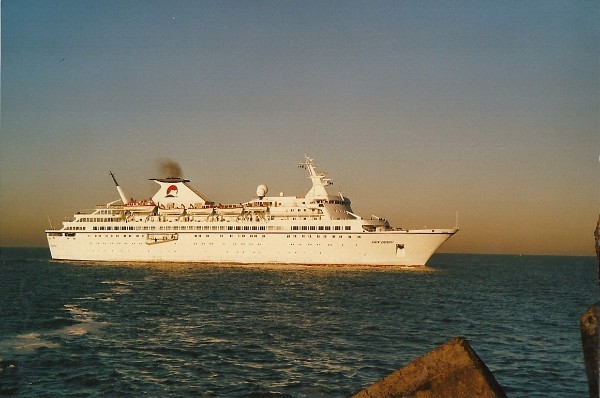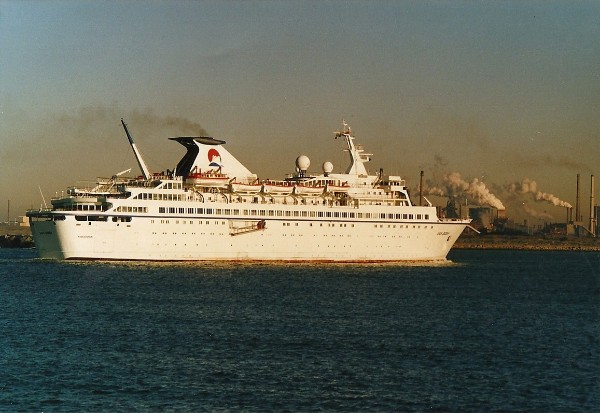Van Gogh

Van Gogh as seen sailing towards the port of IJmuiden at the 18th of december 2003.
In the middle of the 1970's, just a few cruiseliners were built and even company officials from Cunard Line had announced that they expected that the cruiseindustry would not expand any further. This may have been so, but in the East, there seemed to be room for expansion. In the middle of the 1960's, the Black Sea Shipping Company that was based in Odessa, had been adding a class of five 20.000-ton ships intended for the Leningrad (now St.-Petersburg) to Montreal service, but theses ships were also quite well adapted for cruising. These were of course the Ivan Franco (1963), Aleksandr Pushkin (1964), Taras Chevchenko (1966), Shota Rustaveli (1967) and Mikhail Lermontov (1971). Just when the last ship of this class had been launched, they ordered another class of five ships of a totally different design and with a totally different purpose. During the building of the former class, transatlantic services of BLASCO were an ending affair. The new class of five was built for ferryservices as well as cruising, so they were a little smaller, around 15.000 tons.Where the names of the former class were based on those of well-known Sovjet writers, poets of statesmen, the new class was named after republics within the Sovjet-Union. The first ship that was launched in 1974 was Belorussiya, followed in the same year by Gruziya. In 1975, Azerbaydzhan and Kazakhstan followed and the class ended with Kareliya in 1976. During the end of the 1970's and the beginning of the 1980's, another still smaller class of ships were ordered for the Sovjet state companies. Of this class, five ships were added to the fleet of BLASCO, Dmitriy Shostakovich in 1980, Konstantin Simonov in 1981, Lev Tolstoy in 1981, Mikhail Suslov in 1982 and Konstantin Chernenko in 1986, So it seemed that the Sovjets were doing really well in the world of cruising during the 1970's and they did. Despite the Cold War, that was at its height at the time, the cruiseliners were mostly dedicated to the western markets and earned good money for the Sovjet state companies. Sometimes, the ships were sailing under charters to German or English companies.
Our subject was built as Gruziya and was launched from the Wärtsilä wharf at Turku, Finland at the 18th of october 1974. She had been built as yardnumber 1213 and measured 16.331 tons. The ship has a lenght of 156,27 meter, a width of 22,05 meters and a draft of 6,20 meters. She was designed for 504 passengers in cabins and 505 deckpassengers. Her cardeck had the capacity for 256 cars and her normal speed was 21 knots. She flew the flag of the Sovjet Union and her homeport was Odessa. At the 30th of june 1975 the ship was delivered to BLASCO and she sailed as a ferry, but also undertook a lot of cruises, mostly in the Black Sea or the Mediterranean. Because cruising became her main role, the ship was rebuilt in 1984 and more cabins were built into her. She could now sail with up to 650 passengers in cabins, although there still was room for 101 deckpassengers.
Like all other Sovjet-owned ships, the fall of communism in 1991 and the break-up of the Sovjet Union put her under control of the Black Sea Shipping Company, now based in Odessa, Ukraine. Because it was not very easy for the former state-owned companies to commerciallize and become a part of a totally changed world for them, the large fleet of Sovjet-ships became scattered and under the flags of the former Sovjet republics just a very few survived. Gruziya was chartered to the US Millitary Sealift Command in may 1994 as a housing vessel for fugitives in Kingston. This charter ended in may 1995, when she was transferred to BLASCO UK, a new branch for the Ukrainian company based in the United Kingdom and for them she recieved the more international name Odessa Sky. This was short-lived, because she was laid-up at Montreal in august 1996. A month later, she sailed for drydock at Wilhelmshafen, Germany, but instead of being worked at, she was furthermore laid-up.

In august 1998, the ship was sold to a company named Eltek Europe, based in The Netherlands. For them, she was rebuilt at Bremerhaven. Firstly, it was meant for the ship to become a casinoship under the name of Club Cruise 1, but during early stages, it was decided to rebuilt her into a normal cruiseship to restart cruises from Rotterdam, left by the Holland America Line in the early 1970's. Just a few cruiseliners had visited the largest port in the world since then, and it was their goal to refloat the Dutch cruisemarket with the ship. As Club Cruise, the company renamed the ship a little to Club 1, and in their marketing announced that more ships would follow soon. In march 1999 she arrived in Rotterdam for her first season of European cruises, that took her to Norway as well as the Channel Islands and France. But she was unsuccesfull in her new role. The Dutch did cruise, but not from Rotterdam. So Club Cruise changed plans and after one season, Club 1 was chartered out to the French company Nouvelles Frontieres and she was renamed Van Gogh. Of course, Vincent Van Gogh was one of the famous Dutch painters and he also lived in France for a while so it was a very appropriate name for the ship. In 2002, the ship was chartered to Travelscope as well as Warner Holidays and they used the ship both, each for half a year. At the fifth of june 2004, Van Gogh was chartered for one voyage from Portsmouth to Caen to remember the D-day invations that started the end of worldwar II in 1939. For this, she sailed with war veterans and several memorial services were held on board. Later in 2004, at the 27th of september, the ship had a collission with the Greek tanker Spetses close to Gibraltar and this took her out of service for around two weeks. Another problem arose when several passengers were infected by the Norovirus and the cruise had to be cancelled so she stayed in port at Harwich, England. In december 2007, Travelscope, her charterer, was declared bankrupt and the ship laid-up. She was finally put in service by Club Cruise themselves, who created the marketingname Van Gogh Cruises for her from january 2008 onwards.
Club Cruise aquired several other cruiseships, Alexander von Humboldt, Albatros, Flamenco 1 and Astoria. But when the company aquired the Finnish innovative ferry Finnjet for conversion into a cruiseship in november 2007, the economic downturn put the project on hold and it was later abandonned in total and the ship sold for scrap at a huge loss. This loss took the whole of Club Cruise with it and the company was declared bankrupt. Van Gogh was sold at auction to Salamis Lines and was renamed Salamis Filoxenia for them. Salamis Lines was founded by the Salamis Tours Group, founded in 1959 at Cyprus. The Salamis Filoxenia replaced their 1962-built Salamis Glory from 2009 onwards for Mediterranean cruises from their homeport Limassol, Cyprus.

